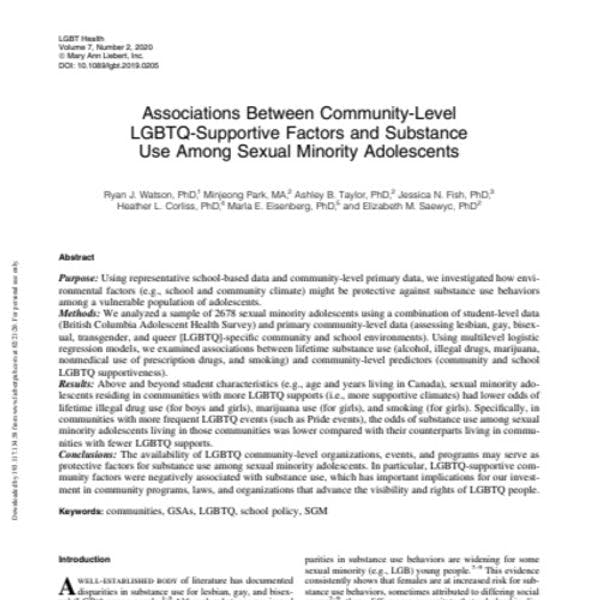Liens entre soutien communautaire pour des personnes LGBTQ et usage de substances entre adolescents des minorités sexuelles
Watson et al. trouvent que la disponibilité des services communautaires a des effets bénéfiques pour les jeunes issus de minorités sexuelles. Pour en savoir plus, en anglais, veuillez lire les informations ci-dessous.
By Ryan J. Watson, Minjeong Park, Ashley B. Taylor, Jessica N. Fish, Heather L. Corliss, Marla E. Eisenberg, and Elizabeth M. Saewyc
Purpose: Using representative school-based data and community-level primary data, we investigated how environmental factors (e.g., school and community climate) might be protective against substance use behaviors among a vulnerable population of adolescents.
Methods: We analyzed a sample of 2678 sexual minority adolescents using a combination of student-level data (British Columbia Adolescent Health Survey) and primary community-level data (assessing lesbian, gay, bisexual, transgender, and queer [LGBTQ]-specific community and school environments). Using multilevel logistic regression models, we examined associations between lifetime substance use (alcohol, illegal drugs, marijuana, nonmedical use of prescription drugs, and smoking) and community-level predictors (community and school LGBTQ supportiveness).
Results: Above and beyond student characteristics (e.g., age and years living in Canada), sexual minority adolescents residing in communities with more LGBTQ supports (i.e., more supportive climates) had lower odds of lifetime illegal drug use (for boys and girls), marijuana use (for girls), and smoking (for girls). Specifically, in communities with more frequent LGBTQ events (such as Pride events), the odds of substance use among sexual minority adolescents living in those communities was lower compared with their counterparts living in communities with fewer LGBTQ supports.
Conclusions: The availability of LGBTQ community-level organizations, events, and programs may serve as protective factors for substance use among sexual minority adolescents. In particular, LGBTQ-supportive community factors were negatively associated with substance use, which has important implications for our investment in community programs, laws, and organizations that advance the visibility and rights of LGBTQ people.
